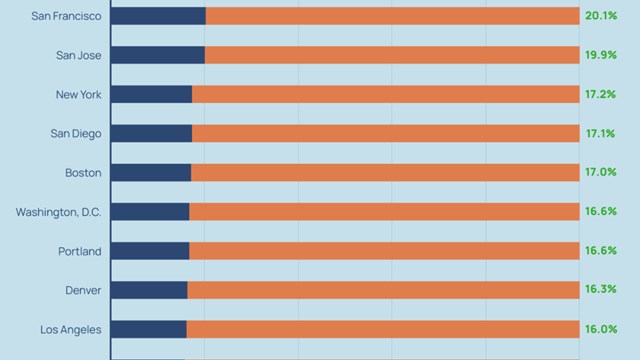With New York City rebounding from a sluggish economy and resulting budget deficit, Mayor Michael R. Bloomberg reached a budget agreement with the City Council that includes a $400 dollar property tax refund to city homeowners, who bore the brunt of last year's 18.5 percent property tax increase-the largest single property tax increase in the city's history. The $47 billion budget was sealed with a handshake between Mayor Bloomberg and City Council Speaker Gifford Miller at City Hall late in the evening of June 21st, and was promptly whisked off to Albany for approval. Legislators, however, adjourned for the summer without approving a state budget or the homeowner's rebate plan. It is expected though that the lawmakers will reconvene a summer session to approve the budget and rebate plan.
If that happens and the plan is approved, according to Jordan Barowitz, a mayoral spokesman, homeowners can expect to receive rebate checks later this fall.
According to the mayor's office, Class 1 and Class 2 homeowners will receive the tax rebate through a program that will cost the city approximately $250 million. Approximately 600,000 owner-occupants of one-, two- and three-family homes, co-ops and condos will receive the $400 refund.
According to Gregory J. Carlson, executive director of the Federation of New York Housing Cooperatives & Condominiums (FNYHC), when all the figuring and re-figuring is done, the $400 refund may not be exactly $400.
"On first glance," says Carlson, "everybody thinks they're getting $400. But co-op and condo owners will get $285 or something in that neighborhood."
Much like the final numbers, the road to a finished budget has undergone some revisions along the way. While the mayor's proposed refund is perceived by some as a small boon to property owners, certain City Council members-specifically Council Speaker Gifford Miller (and a potential mayoral candidate in 2005)-initially objected to the plan, claiming that business owners, condo owners, co-op owners, and homeowners should be assessed differently. In addition, Miller felt the two-million-plus renters in the city should also be compensated. In the end, though, Miller acquiesed to concessions providing tax credits to senior homeowners.
The council's original proposal, according to Barowitz, had earmarked the bulk of the rebate to Con Edison (with a $8.3 million rollback) and large landlords, such as the Met Life building (with a $600,000 rollback) and the Empire State Building (with a $463,000 rollback).
The original tax increase was just a stop-gap measure and other remedies should have been considered, counters Edmund J. McMahon Jr., a senior fellow for tax and budget studies at the Manhattan Institute Center for Civic Innovation. According to McMahon, the property tax increase was a good initiative, but the rate was too high, and other cost-cutting steps should have been implemented in lieu of such a dramatic spike.
Mayor Bloomberg though contends that property owners deserve their $400 worth of relief. "Our hard work is beginning to pay off," Bloomberg said in an address this past January. "The difficult steps we have taken to balance New York City's budget over the last two years have kept New York growing, and maintained the City's control over its own finances."
In 2002, in an attempt to shore up a depressed, post-September 11th economy riddled with pre-existing economic and budgetary problems, the mayor and the City Council agreed to increase city-based tax initiatives that would-hopefully-balance the budget. The course of action was heavily debated, even though a quick influx of cash was desperately needed.
Two years later, the property tax increase has satisfied some budget woes, but according to Michael Slattery, senior vice president of the Real Estate Board of New York (REBNY), enacting new legislation that continues to offer property tax refunds may be shortsighted.
"We thought there should have been more reductions imposed before increasing the tax rate," says Slattery.
McMahon agrees, saying that there should have been a reduction in city payroll and an elimination of non-essential grants monies, including art programs. "Yes, the budget gap was getting worse, but I don't agree with [the increase] being that high; they should have done more to reduce spending by reducing anything and everything possible."
Barowitz counters by saying that the city was faced with closing a $6.5 billion budget deficit gap and immediate steps had to be taken. "By law, the budget gap had to be closed," says Barowitz, "and the property tax increase was one tool the city used to close that gap."
Barowitz goes on to explain that Mayor Bloomberg didn't champion this tax initiative exclusively, but with the aid of administration officials. While there has been speculation as to how the refund will be returned, Barowitz says the across-the-board refund will be sent as a check-not in taxation credits, a theory which was bounced around.
According to Carlson, "From what I understand, [the refund] is supposed to be mailed to each cooperative owner-but where they're going to get that list, I don't know. If they get it from the tax abatement list, those could be people who don't even live here. If they use the STAR abatement rolls, it still doesn't include everybody. The latest statistics I heard have [STAR enrollment] at about 60 percent coverage. It should be very interesting to see how the workings of this are going to evolve."
The New York City property tax system has four classes of property, with each class having a different assessment ratio, a different assessment method, a different process to limit assessment increases, and a different tax rate. In order for taxpayers to have an understanding of their specific tax burden, the city uses a formula that compares properties based on the effective tax rate, which is calculated by dividing the final tax bill by the full market value of each property.
This past February, George Sweeting, deputy director at the New York City Independent Budget Office (IBO) addressed the City Council Finance Committee on the tax treatment of co-ops and condos. When dealing with co-ops and condos, there is a further complication in computing the effective tax rate. Under Section 581 of the New York State Real Property Law, these properties are to be valued as if they are rental properties, and until very recently, the city has tended to value them as if they were rent-regulated properties.
As a result, according to Sweeting, the city's official valuations for co-ops and condos tend to be much lower than if the property were valued using sales price based market values, although the extent of the difference varies across the city. "Given that the goal of co-op/condo reform is to obtain the same tax treatment as Tax Class 1 homes-where sales prices are the basis for setting market values-it seems reasonable to use sales-based market values when computing the effective tax rate for co-ops and condos."
The circumstances are very different in the other boroughs, however, where co-ops and condos shoulder significantly higher tax burdens than private homes. According to McMahon, "The condo/co-op abatement is not efficient and unfair because it is assessed by different boroughs."
Comprehensive co-op and condo reform was expected to involve a shift to sales-based valuation and the application of the Tax Class 1 assessment ratio and tax rate to the properties. Sweeting explains that in the mid-1990s, the Department of Finance asked for time to resolve several tricky methodological and technological issues. Pending development of a plan to achieve comprehensive reform, the current abatement was adopted as a stop-gap to give some immediate relief. However-and because it operates on top of the existing assessment system, which ignores co-op and condo sales prices-the current abatement does not take into account the differences in how much relief is needed.
IBO estimates that of the $250 million in tax relief that will be paid through the co-op/condo abatement in fiscal year 2004, $88 million (35 percent of the total) is unneeded if the goal is to equalize the tax burden for co-op and condo owners.
"More than two-thirds of the unnecessary spending goes to owners with effective tax rates below the Tax Class 1 level before the abatement," says Sweeting. "The balance goes to those with effective tax rates above the Tax Class 1 level, but who do not need all of their abatement benefit to reach the Tax Class 1 effective tax rate. Virtually all of the unnecessary spending occurs in Manhattan, particularly in the prime co-op neighborhoods east and west of Central Park."
On June 1, 2004, Governor George Pataki signed into law
According to some, refund or no refund, with or without agreement between governing bodies, the taxation system in New York City is a tangle that won't likely be straightened out any time soon. "The whole property tax system is arcane," says McMahon, "and it's getting worse."







5 Comments
Leave a Comment